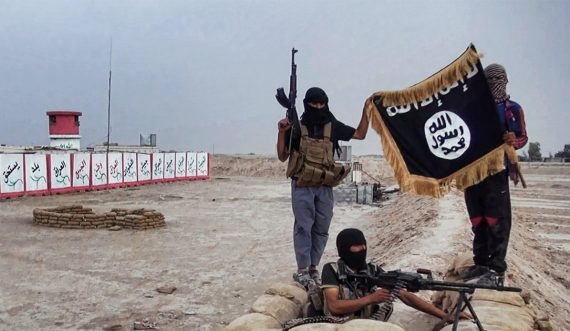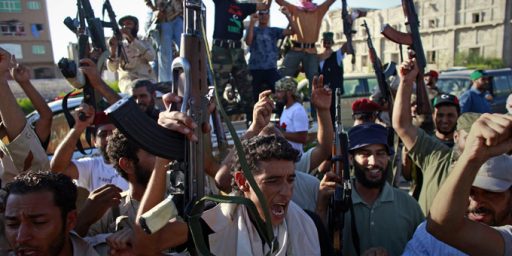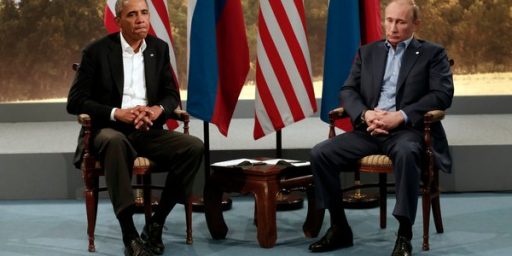ISIS Expanding Its Base In Libya Despite U.S. Attacks
Despite American air strikes, ISIS is expanding its power amid the chaos in Libya.
While the United States and other nations appear ready to increase the pressure on ISIS in Iraq and Syria, reports are surfacing that the group is moving to establish a beachhead in North Africa that could make the fight against jihadist terrorism even harder:
NDJAMENA, Chad — After B-2 bombers struck an Islamic State training camp in Libya in January, killing more than 80 militants, American officials privately gloated. On the heels of losing its coastal stronghold in Surt the month before, the Islamic State seemed to be reeling.
But Western and African counterterrorism officials now say that while the twin blows dealt a setback to the terrorist group in Libya — once feared as the Islamic State’s most lethal branch outside Iraq and Syria — its leaders are already regrouping, exploiting the chaos and political vacuum gripping the country.
Gen. Thomas D. Waldhauser, head of the Pentagon’s Africa Command, told a Senate panel this month that after their expulsion from Surt, many militants from the Islamic State, also known as ISIS or ISIL, were moving to southern Libya.
“The instability in Libya and North Africa may be the most significant near-term threat to U.S. and allies’ interests on the continent,” General Waldhauser said. “Even with the success of Surt, ISIS-Libya remains a regional threat with intent to target U.S. persons and interests.”
Libya remains a violent and divided nation rife with independent militias, flooded with arms and lacking legitimate governance and political unity. Tripoli, the capital, is controlled by a patchwork of armed groups that have built local fiefs and vied for power since Libya’s 2011 uprising. Running gun battles have seized Tripoli in recent days.
“Libya is descending into chaos,” said Brig. Gen. Zakaria Ngobongue), a senior Chadian officer who directed a major counterterrorism exercise here in the Chadian capital last week involving 2,000 African and Western troops and trainers. “It’s a powder keg.”
Libya’s neighbors have rushed to ward off the threat of Islamic fighters seeking safe haven within their borders or trying to recruit their young people to fill its depleted ranks.
Tunisia, which has suffered several devastating terrorist attacks in recent years, has already built a 125-mile earthen wall, which stretches about half the length of its border with Libya, in an attempt to prevent militants from infiltrating.
Since last summer, the United States has been flying unarmed surveillance drone missions over Libya from bases in Tunisia, a significant expansion of that country’s counterterrorism cooperation with the Pentagon.
Algeria announced this month that it had opened a new air base in the country’s far south to help secure its borders with Mali, Niger and Libya.
And Chad closed its borders with Libya in January, fearing potential terrorist infiltration. The country reopened one main border crossing this month under pressure from border towns suffering a dearth of commercial traffic and to allow Chadian citizens to return home from Libya.
“As long as the Libyan chaos lasts, security in the Sahel and the Sahara will always be strained,” President Idriss Déby of Chad told a regional security conference in Bamako, Mali, this month. The Sahel is a vast area on the southern flank of the Sahara that stretches from Senegal east to Chad.
American intelligence agencies offered wide-ranging estimates last year on the peak number of Islamic State fighters in Libya — mainly in Surt, but also in Benghazi and Tripoli — with some assessments topping 5,000 militants.
Perhaps several hundred of those fighters have survived and fled in various directions within the country, or even to Europe, military officials and intelligence analysts say.
“The multiple militias and fractured relationship between factions in east and west Libya exacerbate the security situation, spilling into Tunisia and Egypt and the broader Maghreb, allowing the movement of foreign fighters, enabling the flow of migrants out of Libya to Europe and elsewhere,” General Waldhauser said.
This isn’t an entirely new development, of course. Reports about ISIS spreading its influence between Iraq and Syria have been percolating for several years now. In many cases, that effort has been limited to forming alliances with local extremist groups, but there have also been reports about ISIS itself moving into areas beyond its current sphere of influence such as Afghanistan and Yemen and pulling off attacks in areas that it was not known to have previously existed, such as Saudi Arabia. Additionally, there were reports of ISIS moving into, and establishing alliances in, Libya in the wake of the chaos that has resulted in years since the Gadaffi regime collapsed and was replaced by a government that has little control of anything outside of Tripoli and the area immediately around it. As a result, it wasn’t much of a surprise when we started hearing reports that the U.S. had started targeting areas in Libya where ISIS was known to be establishing bases, and the recent B-2 bomber attack noted above was obviously a part of that strategy.
As I’ve said before, it’s not surprising that ISIS is taking advantage of the instability that exists throughout Libya to establish itself. This is largely the same strategy it took advantage of to expand its power base in Iraq and Syria to begin with and mirrors the actions that al Qaeda took in the 1990s in Afghanistan and after the American invasion of Iraq in the early 2000s. For one thing, that chaos allows extremist groups to set up bases of power without much worry of being bothered by the central government. Additionally, establishing power in an area like Libya would give ISIS access not only to vasts swaths of Northern and Central Africa that are equally unstable, but also put it closer to Europe than it currently is without the worry of having to gain access through a NATO ally such as Turkey. Finally, of course, setting up a base of operations in the Libyan desert means that ISIS leadership and military assets at least theoretically have some place to flee to in the event that Iraq and Syria no longer suit its needs. What all of this tells us, of course, is that the war against ISIS isn’t going to end any time soon, and neither is the sixteen years of war we’ve been involved in since September 11th, 2001.
.






Basically ISIS/AQ is an opportunistic infection, like a pathogen that moves in when the immune system is weakened; the pneumonia of the Muslim world, if you will.
The underlying cause is the failure of politics throughout the MENA. These countries are clearly incapable of achieving democracy and the only sort of stability on offer is some strong man backed by the military, or a set of religious fanatics backed by the military. Islam refuses to legitimize secular politics, and secular politics can’t trust the people because the people are sunk in religious orthodoxy and various levels of tribalism. It’s not a case of the center not holding as there being no center at all.
In the west we fought many wars, many civil wars, many long political and philosophical fights, which finally elevated secular politics over religion – with admittedly mixed results, given that the Holocaust was only 70 years ago and slavery persisted in the US until 1865 and the voters in this advanced democracy just elected a malicious toddler.
But the MENA doesn’t seem to even be on the beginning of a track leading to secularization and democracy. They are trapped in the quicksand of religion – a religion that by rejecting all politics, as well as all secular education, makes chaos inevitable.
BTW, just to extend the metaphor a bit further. If ISIS/AQ is an opportunistic infection, then the US military is playing the role of antibiotic. But I’m sure 4 out of 5 doctors agree that you can’t save a patient who is fundamentally unhealthy, suffering from multiple diseases and with a collapsed immune system. The politics, religion and ideologies prevalent in the MENA are not capable of producing sufficient health to fight off the infection, with or without our help.
How is this possible? Has Trump not revealed his secret plan to the military? We put Iran on notice, wasn’t that enough? There was talk of sending Wee Little Jared over to broker a deal for comprehensive Mid East peace, why hasn’t this happened?
Are there people we could torture? Families we can target? Families we can torture?
Who knew the Mideast could be so complicated?
@michael reynolds: Turkey, Jordan and Saddam Hussein’s Iraq all had made steps towards secularism — they are sliding backwards now, but That can easily be a two-steps-forward,-one-step-back thing rather than a complete failure. Even Iran is developing parallel religious and secular structures in their society.
Not that I have much good to say about Saddam Hussein, but he was less worse for more people than ISIS, the House of Saud, or the Taliban.
I’m an optimist at heart. There’s a backlash against secularism and neoliberalism going on across the world right now, but the pendulum will swing in the other direction soon enough. Look at America — grim at the moment, but over the past 50 or 75 years, there’s been a net change towards more open and integrated society with more opportunities for all.
Remember….trump has a plan to destroy ISIS in 30 days. I guess that 30 days starts as soon as he repeals and replaces Obamacare.
I thought that ISIS was being contained.
@Tyrell:
I thought your president was going to destroy them within 30 days.
Maybe this has something to do with it?
https://goo.gl/images/cL2NmJ
@michael reynolds:
Given the role of the US in promoting instability in Libya, Iraq, Syria, Yemen, and other countries in the area, the role of the US is far from being as benign as you claim, to put it very mildly.